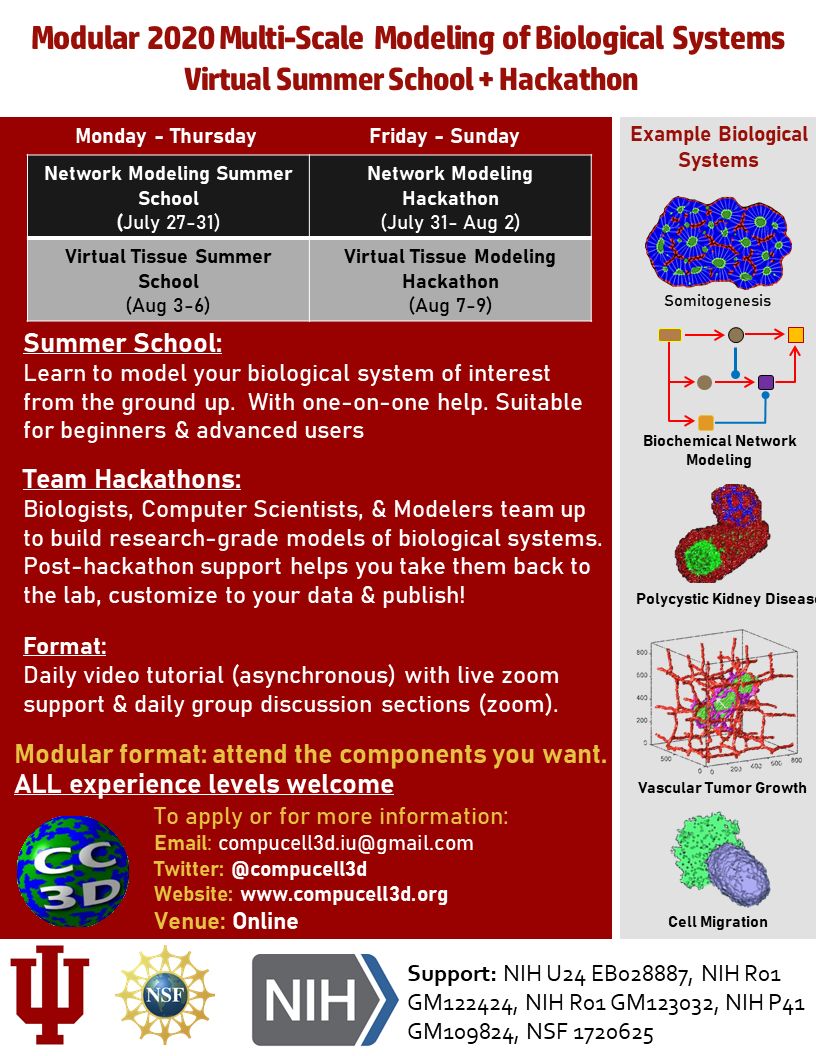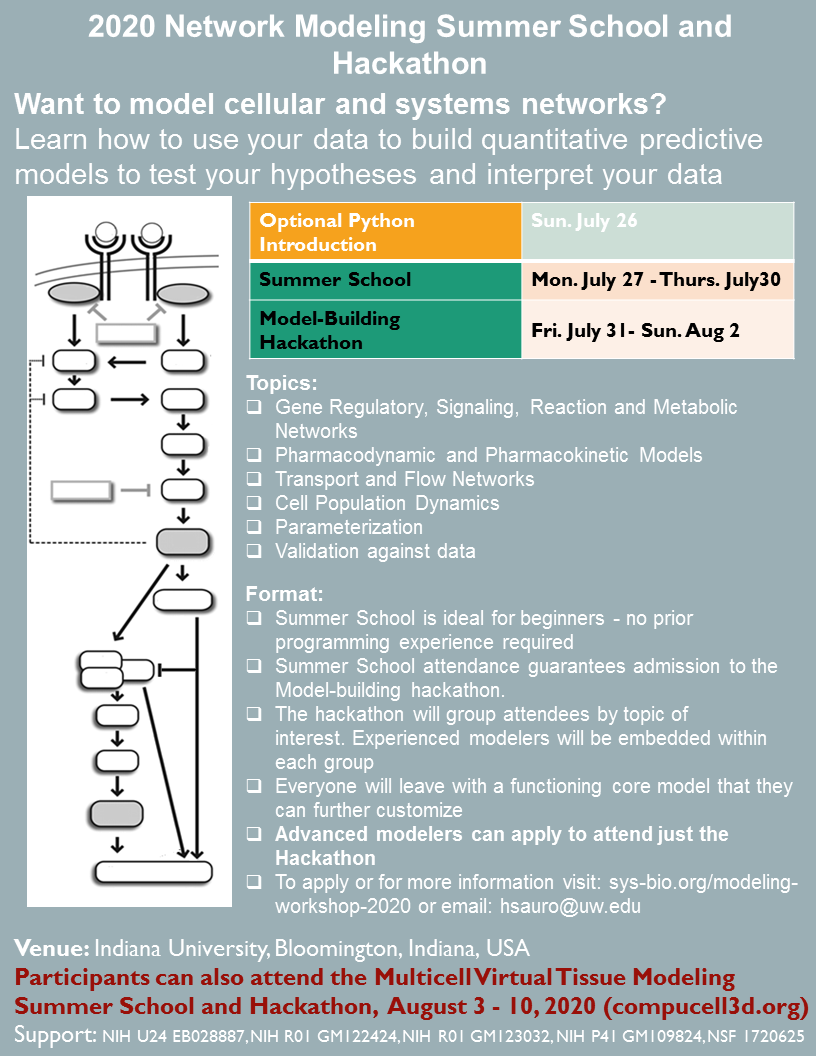CompuCell3D 15th User Training Workshop
July 27th - August 8th, 2020, Bloomington Indiana USA
Page Index
Intro to Python:
We will have 2 days of Python training. These will be on Sunday July 26 and Sunday August 2 day. These are optional, if you are comfortable using Python they can be skipped.
Introduction to Python I, Sunday July 26, 11AM EDT (3PM GMT) - 6PM EDT (11PM GMT)
- Variables, numbers, strings, lists, Booleans, assignments, loops, conditionals, functions, importing libraries, slicing, file input/output, numpy, scipy
Introduction to Python II, Sunday August 2, 11AM EDT (3PM GMT) - 6PM EDT (11PM GMT)
- … will discuss more advanced topics such as classes, objects and dictionaries.
Class Files are here (also has links to YouTube videos of the class) ★ ★
Network Modeling Summer School:
Network Modeling Summer School Monday-Thursday, July 27-July 30, 2020
Hackathon Friday July 31, 2020: If there is interests we can extend the Hackathon to Saturday and Sunday August 1 and 2, 2020
- Class Schedule (tbd)
Class Files https://drive.google.com/drive/folders/10wioSGhvs6SuAZ-k6g8j0sk_dEzdAqg4?usp=sharing
Slack Channel https://join.slack.com/t/multiscalemod-ags3330/shared_invite/zt-g0up1lz7-z5XGFC73UZk1j3BPeW7RVA
CompuCell3D Multicell Virtual-Tissue Modeling Summer School:
Multicell Virtual-Tissue Modeling Summer School Monday-Thursday, August 3-August 6, 2020
Hackathon Friday-Sunday, August 7-August 9,2020:
Schedule & Class Files (files will reside on the Slack channel listed above and in this google drive.) ★ ★ ★
Note: Because of Covid-19, the training workshops will not be held in person. Instead, we will use a combination of Zoom, YouTube and other remote access tools. We will keep attendees informed as the details are finalized.
Combined: |
CompuCell3D: |
Cellular and Network Modeling: |
(click the images to download full size versions of the posters) |
||
Network Modeling Summer School (Monday-Thursday, July 27-July 30, 2020) and Hackathon (Friday July 31. If there is interests we can extend the Hackathon to Saturday and Sunday August 1 and 2, 2020): Covers both basic and more advanced issues for using dynamic models of biological networks. Includes basic concepts of chemical reaction, signaling and gene regulatory networks, stability and sensitivity analysis and deterministic and stochastic modeling. The Tellurium modeling environment allows the specification and execution of network models as part of simple Python scripts, making it flexible and easy to integrate with data analysis and other modeling tools.
Multicell Virtual-Tissue Modeling Summer School (Monday-Thursday, August 3-August 6, 2020) and Hackathon (Friday-Sunday, August 7-August 9,2020): Mechanistic modeling is an integral part of contemporary bioscience, used for hypothesis generation and testing, experiment design and interpretation and the design of therapeutic interventions. The CompuCell3D modeling environment allows researchers with modest programing experience to rapidly build and execute complex Virtual Tissue simulations of development, homeostasis, toxicity and disease in tissues, organs and organisms, covering sub-cellular, multi-cell and continuum tissue scales. Virtual-Tissue simulations developed using CompuCell3D run on Windows, Mac and Linux. CompuCell3D is open source, allowing users to extend, improve, validate, modify and share the core software.
Format: The Summer Schools will include a limited number of lectures and numerous hands-on computer tutorials. There will be breakout sessions for basic and advanced modelers.
In the hackathons, attendees will be grouped into teams based on topic of interest. Each team will include experienced modellers. The teams will each build a functioning core model, which each participant can further customize. Advanced modelers can apply to attend just the weekend hackathons.
Goal: By the end of this two-week course, participants will have implemented a basic simulation of their particular biological problem of interest. Post-course support and collaboration will be available to continue simulation development.
Topics: Python scripting. Introduction to Reaction-Kinetics (RK) models. Introduction to SBML. Introduction to Virtual-Tissue simulations. Introduction to CompuCell3D. Basics of model building. Combining RK and Virtual-Tissue models. Extending CompuCell3D. Building a basic simulation of your system.
Target Audience: Experimental Biologists, Medical Scientists, Biophysicists, Mathematical Biologists and Computational Biologists from advanced undergraduates to senior faculty, who have an interest in developing multi-scale Virtual-Tissue simulations, or learning how such simulations might help their research. No specific programming or mathematical experience is required, though familiarity with a modeling environment (e.g. Mathematica®, Maple®, Python, or Matlab®) and how to represent basic concepts like diffusion and chemical reactions mathematically, will be helpful.
Note: An introductory Python tutorial will be offered on July 26th, 2020. If you are already familiar with Python basics, you may skip this tutorial or attend for review.
Fees: There are no fees. We will provide workshop materials electronically.
Online Participation: The summer schools will support online participation through Zoom. Participants will be need to connect to the webcasts from their home or institution.
Facilities: The workshop will only be available as a Zoom webcast from Indiana University, Bloomington, IN, USA, with some resources available via YouTube.
Registration: Click here to Register!
For more information, please contact: CompuCell3D Team compucell3d.iu@gmail.com.
 CompuCell3D
CompuCell3D

